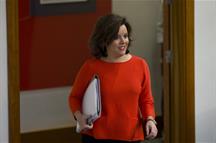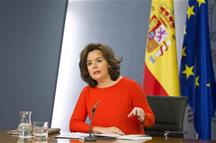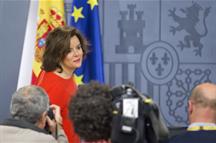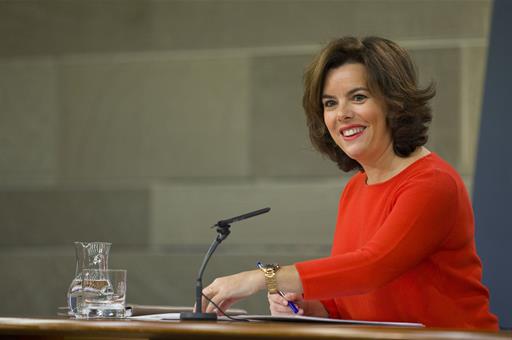Council of Ministers
Government approves Master Plan for National Park Network
Council of Ministers - 2016.10.21
Moncloa Palace, Madrid
The new Master Plan for the National Park Network seeks to improve the planning and management of these high protection natural spaces and provide the network with internal coherence through more homogenous management of the 15 national parks, without "forgetting the singular nature of each one", said the acting Vice-President of the Government, Soraya Sáenz de Santamaría.
According to the Vice-President of the Government, the Master Plan approved on Friday includes "criteria to determine the level of basic conservation", the parameters to monitor them and the guidelines "to determine the existence of serious danger" for the integrity and security of these national parks, together with guidelines in the case of emergencies.
Soraya Sáenz de Santamaría underlined the broad consensus received by the new Master Plan, since it not only received favourable reports from the Environment Advisory Council (Spanish acronym: CAMA), from the National Park Network Council and from the Council of State, but also the backing of the different parties involved (regional governments and conservationist associations).
The Government Spokesperson also highlighted that 2016 marks the centenary of the approval of the first law on national parks, the first in Spain and also in the world. "We can be proud of the fact that in 1916 Spain was the first country to approve global regulation of its national parks".
Subsidies for national coal industry
 Pool Moncloa/Diego CrespoThe Council of Ministers authorised the Institute for the Re-structuring of Coal Mining and Alternative Development of the Mining Districts to put out a round of proposals for additional subsidies, for a sum of 36.1 million euros, designed to alleviate the fall in prices of this mineral on the international markets. This new additional aid will amount to 10 euros per tonne for 2016.
Pool Moncloa/Diego CrespoThe Council of Ministers authorised the Institute for the Re-structuring of Coal Mining and Alternative Development of the Mining Districts to put out a round of proposals for additional subsidies, for a sum of 36.1 million euros, designed to alleviate the fall in prices of this mineral on the international markets. This new additional aid will amount to 10 euros per tonne for 2016.
Furthermore, the government has set up various mechanisms to support the sector, including production subsidies, which are considered "ordinary", with an allocation of 25.3 million euros for 2016, and which operate as an exception to the close of the budget year. Their aim is to cover the losses of the uncompetitive mines included in the Closure Plan, all of them underground.
Hence, the total amount of the aid for the coal mining sector authorised on Friday exceeds 60 million euros.
National Awards
 Pool Moncloa/Diego CrespoThe government also approved an exception to the accounting close approved back in July for the National Culture Awards and for the National Prize for Political and Sociological Science.
Pool Moncloa/Diego CrespoThe government also approved an exception to the accounting close approved back in July for the National Culture Awards and for the National Prize for Political and Sociological Science.
In the field of culture, this decision will allow the awarding of the 22 prizes pending this year, including the Cervantes Prize, the Velázquez Prize and the Spain-Portugal Prize for Art and Culture.
Soraya Sáenz de Santamaría underlined that the National Culture Prizes are State recognition of the world of the arts and literature at the highest level, while also constituting a leading mechanism to promote and spread culture and the Spanish language both at home and further afield".
The National Prize for Political and Sociological Science has been granted by the Sociological Research Centre since 2002.
Restoration of forests on island of La Palma
The government approved an allocation of 1 million euros for the works to restore the forests and the environment in the areas affected by the fire suffered last August on the island of La Palma.
According to the Vice-President of the Government, the works, which will be carried out in the municipalities of El Paso, Los Llanos de Aridane, Fuentecaliente and Villa de Mazo, consist "of undertaking, as soon as possible, hydrological forest restoration and the removal of burnt wood", in order to allow for the natural regeneration of species and prevent the development of erosive processes.
Current affairs
 Pool Moncloa/Diego CrespoWhen asked about the possibility of Mariano Rajoy undergoing a vote of confidence to become President of the Government in the next few days, the Vice-President of the Government declared the need to be "prudent and not interfere" in the internal process of the parties on whom a favourable vote of confidence is reliant. She added that "if there is vote of confidence, we must start to work, to talk and to make an effort" to exploit, as far as possible, the capacity for dialogue and make up for lost time".
Pool Moncloa/Diego CrespoWhen asked about the possibility of Mariano Rajoy undergoing a vote of confidence to become President of the Government in the next few days, the Vice-President of the Government declared the need to be "prudent and not interfere" in the internal process of the parties on whom a favourable vote of confidence is reliant. She added that "if there is vote of confidence, we must start to work, to talk and to make an effort" to exploit, as far as possible, the capacity for dialogue and make up for lost time".
As regards the possibility, as pointed out by the Minister for Employment, Fátima Báñez, of combining full collection of retirement benefits with the performance of remunerated work, Soraya Sáenz de Santamaría said that, if the investiture takes place, then the Toledo Pact will be called as a priority action to be carried out in order to study the reform of the social security system.
As regards the protest that prevented Felipe González from taking part in a panel discussion on Thursday at the Law Faculty of the Autonomous University of Madrid, the Government Spokesperson expressed her "support" for the former President of the Government and asserted that, under our democratic system, rights, including the freedom of expression, are not unlimited. "The rights of one person end when those of others start".
As regards the government's position on the annulment by the Constitutional Court of the regional Catalan law that banned bull fighting in Catalonia, the Vice-President of the Government recalled that the government was not an appellant in this procedure, and stressed that "the rules of the democratic game" dictate that court rulings must be "respected and upheld".





